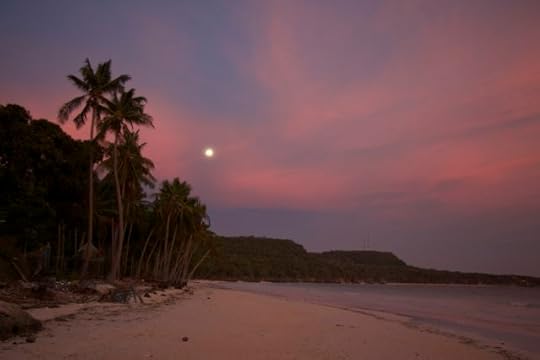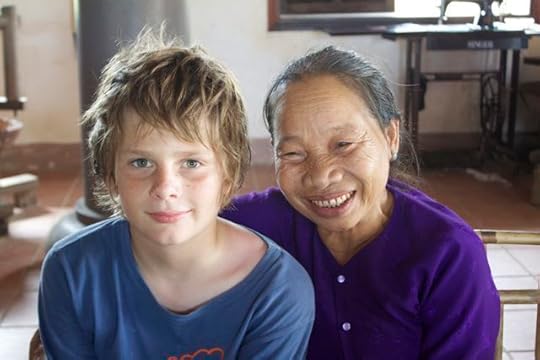Rolf Potts's Blog, page 69
January 31, 2013
Damn the Couchsurfing etiquette
Vagablogging :: Rolf Potts Vagabonding Blog
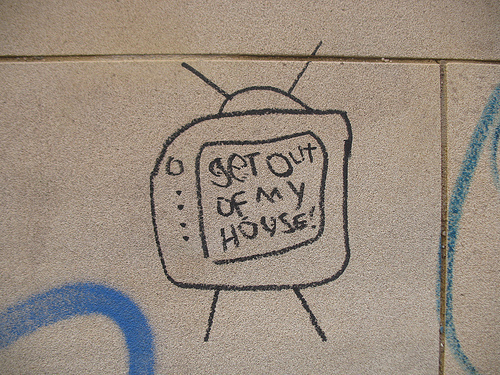
Picture credit: Flickr/ acb
As I have been warmly received by many Couchsurfers in many countries during my past overland trip from Asia to Europe, I decided to re-list myself as “maybe available” on the website. I do not want to start arguing how the site has turned corporate and blah blah blah – and how its alternative, BeWelcome, really looks like it is taking off very slowly -, but I would like to share a few feelings I had after this newly “available” status has made a wreck of my inbox.
I had forgot how , basically, people can be utterly ANNOYING by sending a Couch request. One guy was so creative that he sent me his full 700 word itinerary, day per day, listed hour by hour, asking me to review it and correct it, and, in case, to find a proper allocation for my hosting responsibilities. Another person, more or less asking for information on Penang, tried invariably to push me to host him, saying that his schedule was open to MY availability. And when I answered that I was sorry, I could not, this person answered with something like, “so, tell me when would be the best time to stay at your house.”
What should I reply? I made a point after having hosted many people, and by being hosted and having respected and interacted with many others on different levels: Couchsurfing needs to have a PERSONALIZIED touch of RESPECT. People are not very respectful , apparently, as any Couch request I receive lacks BOTH. At first, I had compiled a neat series of contact and hosting rules on my profile. Invariably, when I realized nobody was reading those rules, and that they just contributed to open the flood of pretentious email communication over my head, I just deleted the rules and got myself out of the hosting chore.
The best request came in a week ago: this couple had apparently traveled on the cheap for a while, found my profile, noted a deep connection with my experiences, and decided they definitely HAD TO meet me. The timing was unfortunately not right, but I still took time to answer their numerous questions, and politely replied telling them to contact me once on the island, so that we may have hung out and I would have found them a very cheap accommodation to stay at.
When they replied, I was amazed by the utter disrespect of my personal situation: the couple in question, again, blatantly asked that ok, THEY NEEDED TO CRASH AT MY HOUSE. When I answered pointing out that my own profile states that I CANNOT host couples as I do not have space, the guy answered with a one line note, saying “ah ok, thanks”. Do you think I have received a phone call, met this people and helped them out? Of course not, because as soon as my couch was not available… they DISAPPEARED. Do you know that a double room in Penang can cost as low as 6$ for two persons per night? I do not want to comment any further.
Another person I met somewhere around the world – and never hosted me, actually – arrived in Penang: not only he was welcomed, sheltered, offered a home cooked dinner, a warm shower, movie time, a clean bed and a lift the next day. No, this was not enough. As I was expecting my partner to get up and prepare breakfast for everyone, he was in a rush to go. And he asked, quite scornfully, where was his damn breakfast. In that case, I politely answered: “In the shop downstairs. Wait or get out.” When it’s enough, it’s enough.
This last Couchsurfing exchange particularly left me highly disappointed: so, am I interesting only when you come in and stink my house with the dirty laundry you expect me to do for you? Maybe you even want to hump my leg, for a change?
I just want to conclude by saying that more than once, after I met my initially reluctant hosts and I showed I was a decent, interesting guy, most of them changed their minds and decided to offer me a place to stay, regardless of their initial decision. Hopefully the readers of Vagabonding may find this rant helpful, and will spread the word about a dire need to change the Couchsurfing etiquette, as having traveled 100 countries by hitch-hike or on horseback is not enough to qualify you as better human beings. I think human interactions should still be dominated by politeness, and RESPECT: we may all want to help out and LEARN something from you. Therefore, I say it: screw your aggressive, irresponsible and blatantly selfish Couchsurfing “etiquette”. Get off my couch!!
Original article can be found here: Damn the Couchsurfing etiquette
January 29, 2013
Looking for new Field Reporters!
Vagablogging :: Rolf Potts Vagabonding Blog
The Vagabonding Field Reports series has been going strong! We’ve seen dispatches from all over the world! Such places as Guyana, Tokyo, Sydney, St. Vincent, Croatia, Dubai, Cape Town, Guatemala, Thailand, and New Orleans. Columbia, Champagne, Peru, Ireland, La Paz, Bosnia, and the Galapagos. And with some stunning photographs to boot! The series is even better than we hoped it would be.
Whether it’s traveling with children, starting off on a first adventure, or learning how to make a living with a guitar, we’re showing that anyone can break the mold.
Our currently traveling vagabonders share their current experiences out and about in the world. Through their Field Reports, you’ll find out what the cost of living is in Argentina, the weirdest thing seen in Paris, or what a typical day in Thailand might be like.
Are you on a long term trip right now, traveling through new countries? Living out of hostels for a few weeks, and then volunteering on a farm for a few more? We’d love to hear from you! We are always on the lookout for new Field Reporters.
Drop us a line at casestudies@vagabonding.net and tell us a little about yourself.
Original article can be found here: Looking for new Field Reporters!
Vagabonding South Sulawesi, Indonesia
Vagablogging :: Rolf Potts Vagabonding Blog
If you’re vagabonding in SEA and trying to get off the beaten track the Indonesian island of Sulawesi is a great place to do just that, especially during the low season of Dec. – Feb. There is a reasonably reliable network of bus service around the island but the roads are terrible and the rate of bus crashes seems (based on observation) higher than average for Asia. Not surprising, given the state of the roadways. If you can rent your own car, it’s a ticket to freedom on the island, but be prepared for people to be shocked that you’re driving yourself. Apparently everyone hires a driver or takes busses!
If you are looking for an excellent guide or arranger of further guides, Dodo Mursalim, in Makassar is your man. He’ll pick you up at the airport, deliver you at hellish hours, and even put you up in his house. He’s a wealth of information about Sulawesi and has uncanny connections all over the island. His email: donow77@hotmail.com
Rantepao is in the heart of the region of Tana Toraja, which should not be missed. Plan to stay several days to a week, slow down, explore, and try to see a funeral. Nicholas Pabara is a fantastic guide, he asked me to share his phone number with fellow travelers: 082-192-183-677. Having a local to tell you the stories, explain the history and find the out of the way things that you won’t find on your own is priceless. You’ll definitely want him to help you place a bet at the cock fights!
Bira is at the eastern tip of the northern arm of Sulawesi. It’s got a pleasant tourist slum with cheap accommodation, but if you head out of the tourist district to Bara Beach there are six little bungalows for rent on a deserted beach that are a little slice of heaven. A boat can be arranged to the facing island where the diving is world class. This is the place to kick back and relax for a few days away from the hustle of Indonesian cities.
Samalona island is listed as an afternoon trip from Makassar in some of the guides. A better bet would be to head out for three or four days and stay in the home of one of the seven families (all inter-related) who live on the island. To get there, take a blue bus to Fort Rotterdam, cross the street to the waterfront and the boatmen will find you. There is no electricity (a generator will be turned on in the evening) no running water, no shower, and no hot water, but it’s a welcome respite from the bustle of Indonesian cities and the snorkeling is pretty good. You’ll find the islanders welcoming, generous, and their fresh from the ocean cooking worth staying an extra day for. If you have an instrument, bring it, music is welcome in the evenings. It costs about $20 USD a night for lodging and three square; can’t beat that.
Original article can be found here: Vagabonding South Sulawesi, Indonesia
January 28, 2013
Singapore and Southeast Asia cities top list of best-connected cities for Wi-Fi in budget accommodation
Vagablogging :: Rolf Potts Vagabonding Blog
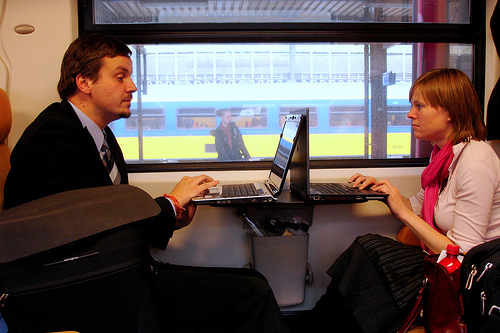
Man and women using laptops on a train. Photo: Marco Raaphorst / Flickr
Are you looking for a place to plug in to the Internet and get work done while traveling? Singapore is the No. 1 city for budget travelers looking for Wi-Fi in accommodation, so says a study by Hostelbookers. The next cities following were Ho Chi Minh City, Bangkok, Siem Reap and Seoul.
If you work over the Internet, the good news is that connectivity is getting better and better. On the flip side, it makes it harder to escape work and get away from people back home who try to contact you. Ah, technology is a double-edged sword.
On a related topic, how many of you travel with laptops, tablets or smartphones? Until very recently, I carried none of these and made do with Internet cafes and public computers in hostels. The nice thing was not having to carry as much stuff and worry about things getting stolen. The downside: I once lost almost all my photos of Laos due to a virus on an Internet cafe computer that infected my memory card. Yikes.
Please leave your thoughts in the comments.
photo credit: Marco Raaphorst via photopin cc
Original article can be found here: Singapore and Southeast Asia cities top list of best-connected cities for Wi-Fi in budget accommodation
January 27, 2013
There’s a market for “personal transformation” in travel writing
Vagablogging :: Rolf Potts Vagabonding Blog
“There are definitive stories about nearly every place on Earth now. And with so many other ways to get information — if you want to know about Albania, for example, you can now much more easily ask the Albanians — the point of travel writing has fallen out. There’s an increased pressure on travel writers to create a personal arc of, yes, transformation. Sure, you went to Iceland, but did you go there because of a personal crisis and then resolve said issue with a Icelandic lover? No? Well, no six-figure book advance for you then.”
–Jessa Crispin, “On the Road Again,” The Smart Set, August 1, 2011
Original article can be found here: There’s a market for “personal transformation” in travel writing
January 25, 2013
Vagabonding Case Study: Christie Peucker
Vagablogging :: Rolf Potts Vagabonding Blog
Christie Peucker
Age: 32
Hometown: Adelaide, Australia
Quote: “You just have to say, ‘this is my plan’ and go about putting things in place necessary to make it happen. And as for those who tell you, you can’t…. run full speed in the opposite direction. It will be the best decision you ever made.”
How did you find out about Vagabonding, and how did you find it useful before and during the trip?
I heard about Vagabonding through a friend who said this site was “made for” me. I found myself coming back to it time and time again on the road, particularly when I was having a “why am I doing this hair-brained adventure again for?” kind of a moment. Sometimes you need that little bit of reassurance that you’re not the only person out there taking risks and that positive reinforcement always managed to get my “get up and go” juices flowing again.
How long were you on the road?
I have been traveling for years but for this adventure – 30 Days for 30 Years – I was on the road for exactly one year. I left Australia on my birthday and returned on my birthday a couple of weeks ago. It has nice symmetry with the reasons behind my trip.
Where all did you go?
Well, 22 countries depending on whom you ask. (Is Macau part of China? And do you recognize Kosovo as an independent State?)
For an entire year, I traveled on 12 crazy whims, relying on my nous, or lack thereof, and the kindness of strangers. I had no support, no companions, and nowhere to stay. This is what I did:
Month 1 – China – I ran the Great Wall of China Marathon
Month 2 – Western Australia – Cygnet Bay – I worked out on a pearl boat.
Month 3 – Israel/France – I did a self-guided pilgrimage around Israel and then visited the Grotto in Lourdes, France.
Month 4 – The Netherlands – I learned to make cheese in Holland (it’s my favorite thing!).
Month 5 – Norway – I worked on two short films and randomly appeared half-naked in a music video wrapped in cling wrap (there’s one to tick off the bucket list!).
Month 6 – Mongolia – I trained eagles in the Altai Mountains in the Kazakh region of Mongolia.
Month 7 – Malta – I worked on a Norwegian reality TV show shot on the Mediterranean.
Month 8 – USA – I lived like Dolly Parton in her home town in Tennessee i.e. I went into a studio and recorded one of her songs, donned a wig and did a photo shoot etc
Month 9 – Costa Rica – I learnt to paint antique ox carts in the artisan town of Sarchi.
Month 10 – Taiwan – I rode a bicycle 1678km around this hilly wonderland.
Month 11 – Mexico – I sailed on a pirate ship (complete with cannons) from Seattle, USA towards Mexico but we hit a storm, were forced to call mayday and were rescued by the US Coast Guard. Epic!
Month 12 – Kosovo – I went to Kosovo and volunteered – my way of paying it forward after the life-changing adventure I had just had.
I also visited the UK, Jordan, Russia, Serbia, Macedonia, Hong Kong, Macau, Singapore and Sweden as part of these adventures.
What was your job or source of travel funding for this journey?
I’m a journalist by trade but I had a very limited budget – less than $1000 AUD a month (due to a perverse obstinance to make it too easy for myself!). I saved a good chunk of money before leaving Australia but not nearly enough to live off for a year, so I very much relied on the random kindness of strangers when it came to accommodation. And boy did they deliver. I am indebted to each and every one of them. I also wrote a couple of columns about my travels for newspapers in Australia which kept a steady, albeit tiny, trickle of funds coming through to keep commitments I had at home at bay.
Did you work or volunteer on the road?
I’ve worked three of my 12 months and volunteered for another one. My second month I went out and worked on a pearl boat in a remote part of the Kimberley. I liked the idea of doing a really sweaty manual labor job because it was so far removed from my usual world sitting in front of a computer all day. I must say, it’s kind of nice to come home physically exhausted after a hard day rather than being mentally exhausted. And the scenery was nothing short of spectacular.
Six months in, a job I had teed up with a newspaper in Norway had fallen through so I made ends meet by doing lighting and cinematography on two short films (I had no experience doing either so just winged it!) and I was an extra in a music video with two of the most famous guys in Norway.
My sojourn in the film world led me to a gig on a Norwegian Reality TV show shot in Malta, where I started as a production assistant but was bumped up to the head of cinematography after the Art Director became ill two days before we were scheduled to leave Norway. It was not part of my original itinerary but when are you ever going to be able to say you got to stay in a five-star hotel and cruise around on luxury yachts for work?
My final month I reserved specifically for paying it forward. That landed me in Kosovo where I volunteered with an amazing NGO called The Ideas Partnership, which helps underprivileged kids in the poverty-stricken town of Fushe Kosove. The Ideas Partnership holds catch up classes for the kids who still want to learn but are banned from attending mainstream school because they don’t have shoes or are deemed too dirty to attend. They also hold classes for local girls who wear headscarves. They too are banned from attending school. TIP also runs a number of environmental and social enterprises in the area.
Of all the places you visited, which was your favorite?
Such a tough, tough question. I’m not sure I can really name a favorite. Israel was probably the most interesting, cruising in and out of the West Bank and visiting all of those biblical sites.
Norway really captured my heart so I will always have a soft spot for Oslo and the people of Taiwan were certainly the most generous but its funny… at the end of every month I’d think to myself, “wow, that was pretty amazing. I don’t know how next month will ever be able to top that.” And then of course it did, but for different reasons.
Was there a place that was your least favorite, or most disappointing, or most challenging?
Mongolia! Hands down the hardest month I had on this journey but certainly not one that I would ever replace. I had a bad taste in my mouth right from the start after being deported from the country within 15 minutes of landing for not paying a bribe to an immigration official. $3500 later when I finally did make it past passport control, I had a horrendous 64-hours bus ride, followed by a string of incidents which make me shudder every time I think about them (keep an eye out for 30 Days for 30 Year the book for more details!). Just three showers in four weeks is certainly not my cup of tea but an experience I will remember for the rest of my life.
Did any of your pre-trip worries or concerns come true? Did you run into any problems or obstacles that you hadn’t anticipated?
I kind of have a penchant for random adventures and taking risks, and I very much believe that everything happens for a reason. But my biggest pre-trip worry is always ‘what am I going to do when I get back?’ When you’re traveling its like your real life is on hold. I was certainly plagued by concerns about whether I was making the right decision to leave in the first place. I had a good career and in this climate you think, ‘am I going to be able to return to it?’ And of course there is the financial side. We all have commitments in one way or another and you don’t want to put yourself in a position where such an adventure becomes a burden down the road. But sometimes you have to take a leap of faith. As one friend said to me, ‘Your resume looks good now so you will be no less employable in 12 months time.” If anything I am probably going to be more employable. I didn’t just take 12 months off to backpack aimlessly around the world. I have a goal to write a book about my journey and I think future employers will respect that I took a chance and was willing to adapt to new environments. I think versatility and those types of qualities are what people look for these days. I’ve looked at this journey from the perspective of what I can gain from it, not what I could possibly lose. It could be that taking this risk gives me everything I ever wanted so I’d be crazy not to try. As they say, fortune favors the brave.
Which travel gear proved most useful? Least useful?
I am a seasoned traveler but for some reason I made the stupid decision to leave my (top loader) backpack at home and take a friend’s front loader. I had reasons for wanting a front loader but you should NEVER travel long term with a pack that is not fitted to your body right. It was the biggest mistake I made on this trip and one I will never make again.
My iPhone was hands down the most useful thing I traveled with. So often it got me out of binds thanks to the spreading network of free wifi around the globe.
What are the rewards of the vagabonding lifestyle?
You see the world at its best. 99 per cent of what we see on the news is negative, people hating on other people. In real life, you witness that human kindness really is overflowing. No matter what their background, most people just want to be happy. They want to find someone nice to share life with and enjoy it. That’s what you see as a vagabond.
I’ve had people offer me a bed in the most trying of circumstances for them personally and yet they’d go out of their way to help me nonetheless.
What are the challenges and sacrifices of the vagabonding lifestyle?
The list is endless. Not knowing where you are going to sleep at night; The constant worry about money; The inability to communicate at times; Unfamiliarity of your surroundings; Loneliness; Missing important family occasions because you are half way round the world etc.
Being in these sorts of situations builds character though and certainly makes you a more compassionate, kinder, resilient and adaptable person. You can’t sweat the small stuff when you are forced to sleep in a bus shelter.
What lessons did you learn on the road?
That happiness is a choice. You do not need money in the bank (although it certainly helps) to travel the world or to get the most out of your chosen life you just need to wake up each day with an open mind and a smile.
How did your personal definition of “vagabonding” develop over the course of the trip?
I think it was the realization – and acceptance – that doing something different in my life doesn’t make me a failure. As JRR Tolkien said: “Not all those who wander are lost”.
Getting up at 4.30am and milking goats in Holland was one of the best times I’ve ever had so just the realization that I could actually go and do something like that as a career and do it successfully if I chose to has been an eye opener. Had I not have taken this risk, I wouldn’t be aware of those potential opportunities.
If there was one thing you could have told yourself before the trip, what would it be?
To remember that those at home are often going through the emotional rollercoaster with you and sometimes they need a little reassurance too.
Any advice or tips for someone hoping to embark on a similar adventure?
It’s so easy to make shoulda, woulda, coulda excuses. We all have commitments; we all have things tying us down. It really comes down to how much you want it. People contact me all the time saying how much they love what I’m doing but it is invariably followed by a “…but, I could never do it because of x, y and z.” It’s easy to think that way. I have before. But really, it was only me limiting myself. Only you can change your life and make it what you want it to be. It doesn’t have to be something as big as taking a year off, it can be the smallest thing. You just have to say, ‘this is my plan’ and go about putting things in place necessary to make it happen. I made a choice – I got busy living. Simple as that. And as for those who tell you, you can’t…. run full speed in the opposite direction. It will be the best decision you ever made.
When and where do you think you’ll take your next long-term journey?
Trying to get 30 Days for 30 Years published into a book is the next big journey (anyone interested in signing me?) so who knows how long that experience will take but I’m thinking Bangladesh and India might be my next big treks.
Website: www.30days30years.com
Twitter: 30days30years
Are you a Vagabonding reader planning, in the middle of, or returning from a journey? Would you like your travel blog or website to be featured on Vagabonding Case Studies? If so, drop us a line at casestudies@vagabonding.net and tell us a little about yourself.
Original article can be found here: Vagabonding Case Study: Christie Peucker
January 24, 2013
A Moving Museum Experience in Memphis
Vagablogging :: Rolf Potts Vagabonding Blog
Having recently been in Memphis over Martin Luther King Jr.’s birthday weekend, realized once again that few things make you feel connected to history like being near a historic landmark on a significant anniversary. There is something special about being near it on that day. In this case, it’s the thought-provoking National Civil Rights Museum on the birthday of the great icon of the movement.
Ironically, the site is located not at the place of his birth but the place of his assassination. The façade of the Lorraine Motel, where King was murdered by white supremacist James Earl Ray in May of 1968, is all that remains of the low-rent building. Left just as it was at the time of King’s murder, the façade remains eerily frozen in time: a tacky 60’s turquoise-and-yellow sign stands in the parking lot. Nearby, a wreath marks the spot where King’s life was taken as he relaxed on the balcony outside room 306.

Lorraine Motel in Memphis, site of MLK's murder.
It’s not just the site of his death that draws visitors on his birthday; the museum complex attached to it is the real attraction. Built in two phases over several years, the sprawling, state-of-the-art space—much of it underneath a hill adjacent to the motel’s dingy old façade—features listening posts, artifacts, records, and archival films detailing the civil rights activists’ efforts to win equality for all. Aside from the physical relics, a 12,800 square foot expansion project called “Exploring the Legacy” offers compelling insight into King and the movement he led.
On my first visit to the museum a few years ago, Memphis sweltered under a boiling summer sun and only a handful of visitors were present. This time, as I enjoyed a friend’s wedding weekend on the anniversary of his birth, the chilly winter day saw hundreds coming to show respect for King and, more importantly, to show their children the museum dedicated to the civil rights struggle. I imagine how strange it must be for a child to learn that, just a few decades ago, a large movement of brave activists had to fight bullets, bombs, and hate to win liberties now taken for granted.
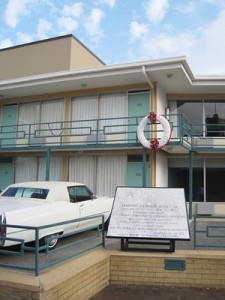
Site of the assassination.
Driving through town I catch a fleeting glimpse of the site. The commotion of the friend’s wedding weekend is temporarily forgotten as the instantly recognizable motel sign catches my eye. I feel a sudden, poignant tug at my emotions as I glance to the Lorraine’s façade. There, just outside room 306, a small wreath lies on the cold concrete of a motel balcony, a silent testament to a profound truth: Lives can be taken, but words and ideals that speak to the better angels of our nature can change the world. And that’s worth celebrating.
Original article can be found here: A Moving Museum Experience in Memphis
Travel Writing is still a tough business
Vagablogging :: Rolf Potts Vagabonding Blog
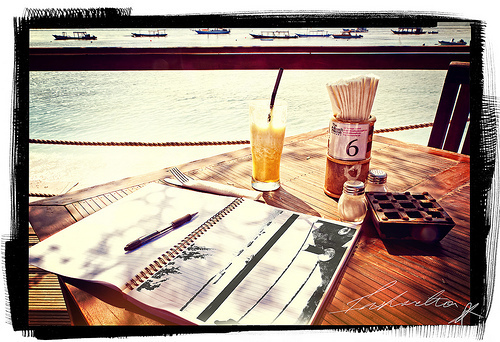
Photo credit: maxymedia/Flickr
I think it is never too late or too biased to try spending a few words on the travel writing subject, as this still constitutes an activity that many vagabonds fancy to help substantiate their living on the run.
Since I started writing for Vagabonding one year ago, I have more and more delved into the world of the written word; luckily, with very hard work I have made some progresses in terms of getting a series of published paid features under my belt, and currently I am even ironing out a book deal. As long as I am still far from being able to say that I write profitably, my growing portfolio has helped expand my opportunities, tune my ability to deal with busy editors, and generate some extra income – peanuts, mind you – from my personal website.
I fondly remember reading the rules of a travel writing competition somewhere on the internet upon entering Nepal. It read something like this: “If you can confidently say that you make about 40% of your total income by writing about travel, then it means that you ARE a travel writer. But you may still apply to our contest!”
“Great”, I said to myself rocking proudly in my seat, “I am a travel writer now! Wooo-ooo!”
In reality at the time – during my Asia to Europe overland trip, for the best part of year 2012 – my monthly income roughly totaled 250$, a 40% of which coming from article pay and my “travel website” meager revenues. Yeah, I was definitely a travel writer by their standard, but what if I had to be one in Las Cruces New Mexico, instead of Mahendranagar Nepal? The difference would have been weighed in the amount of days I would have been able to stay on the road and feed myself – and my partner, bear in mind! – with that little pocket money. Thank God, the Indian Subcontinent is a very cheap place to live and travel.
Some people told me I was nuts; some other patted me on my back and said I rocked. Me myself, I really thought and still think that I had better found something else to do on the side –and luckily, I have been awarded a PhD scholarship and am now comfortably living in Malaysia with such an allowance, finally making the travel writing “income” a substantial bonus to actually earn some bucks as I fancy the “nomadic lifestyle”.
Based on the above, do we still think that trying travel writing has sense? For how long will we be able to be happy by eating banana pancakes and sleep in roach infested motels just to make ends meet?
Wouldn’t it just be better to have a normal job back home, and take a few months off to travel every year?
I constantly change the answers to all of the above questions depending on my luck and my mood on the day.
In a very explanatory article I recommend, travel writer Tim Leffel put it in a way I like: “Before you fall for it, remember that it is also glamorous to be a rock star, a best-selling novelist, or a starter for the Lakers. It’s not so glamorous, however, to be an aspiring actor (waiter) in Los Angeles, an aspiring songwriter (waiter) in Nashville, or an aspiring novelist (waiter) in New York.”
For the moment, by saying that I do not have to clean up tables and shuttle drinks in New York, but browse books in Kuala Lumpur as I write on the side, it’s already been quite an accomplishment. For the rest, I guess that what is really moving me forward along this way is the fun of it. And not last, the really depressing, over generalizing quality of most of the “travel writing” content I see around the newsstands’ racks these days.
If any of you have any other worthwhile suggestions or considerations to add, please comment below.
Original article can be found here: Travel Writing is still a tough business
January 22, 2013
Three things I hope my kids will learn from life and travel
Vagablogging :: Rolf Potts Vagabonding Blog
We’re sneaking up on our fifth anniversary of full time travel with our kids. When we left on our bicycle trip around Europe and N. Africa they were five through eleven years old. They are now ten through sixteen, and as comfortable in the livestock market in Tona Toroja as they are in a department store in the USA.
We travel specifically for the education and development of our children; we want them to grow up in the real world and become citizens of it in a way that transcends borders. There are so many things they learn in a classroom without walls, here are three of the most important:
1. People Are People
You can preach tolerance and multi-culturalism in a classroom until you’re blue in the face, but it’s so much easier to just take your kids to a park in every country you pass through, have as many guests in for dinner as you can lay hands on, and accept every offer of food or shelter from strangers as you go. Before long the kids stop seeing skin color, stop worrying about what kind of food hits the table, and get over stressing out about the language barrier. Pretty soon they’ll take off to play with the Indonesian kids and carry a soccer ball so that they can always draw in kids to play with.
I remember, when I was young, hearing my Dad say that it was good for my brother and I to have the experience of being, “The only white people within a couple hundred miles.” What he meant by that was that it’s a very good thing to experience life as a minority, perhaps to even be discriminated against a little bit. It builds compassion in a way little else can. It helps a developing person to see the commonalities, instead of the differences: We’re all doing our best to keep a roof over head, feed and clothe our families, celebrate the beautiful things in life, and leave the world a better place for our children.
It’s hard to hold on to an “us vs. them” mentality when you’ve eaten a meal with “them,” and count “them” among your friends. One of the primary benefits to liberal travel with children is that this lesson is absorbed organically, you won’t have to say a word to teach it.
2. Live Generously
We are not rich people, but on a world scale, we are fabulously, ridiculously, filthy-stinking rich. Just the ability to make American dollars as we travel and spend them in places that they go much further is a huge lottery win on the international economic scale.
We have dear friends who live in huts with dirt floors and metal roofs rusted through with holes. Others who support families of seven on less than $5,000 USD a year; some far less.
There is a lot of talk in traveling circles about how to give, and where to give, or more specifically, where NOT to give, so as not to exacerbate the problems. Careful consideration must be given to that balance.
In our experience, it is always better to live generously. When a need is presented, we try to find a way to give into it to fill it in a way that empowers instead of enables. We hope that our children will recognize their extreme privilege on the grander scale and do the same. We see glimmers of it, in their willingness to share the little they carry in their packs with kids who have far less. Their willingness to stretch a buck or do with less so that we can give more to someone else. And sometimes, they’ve seen us get taken advantage of too. But there’s a lesson, even in that: the “takers” are in the vast minority, and living generously is worth the risk.
We have so much, how can we not give?
3. Tread Lightly
The invention of plastic was simultaneously a boon and the bane of human existence. Trash is strewn from horizon to horizon across Tunisia. Barefoot children pick through heaps of plastic detritus in the margins of virtually every paradise. Plastic grocery bags are caught, like limp jelly fish on the coral of dying reefs in even the “best” of the world’s dive destinations. Jakarta is a fetid cesspool. Walking out in Beijing puts your lungs at risk. We can talk “green” all we want, but these are realities, and realities that are hard to remedy in places where money, education and resources are lacking.
It’s easy to look at the global problem and throw up our hands. We talk about that, in various arenas, with our children on a regular basis. But the answer lies in our own two hands. Understanding that every choice we make has consequences for the planet, and every piece of plastic anything that we buy will end up in a landfill somewhere eventually.
It’s not just about the three R’s, reduce, reuse, recycle, although those are important. We have to learn, as a race, to “need” less. To be happy without consuming more “stuff” and to tread lightly on the planet. One of the easiest ways to “teach” this is simply to travel. To allow kids to see the consequences of our over consumption first hand, and to connect the dots between the first world usage and the prices paid for that in other parts of the world. With global eyes, perhaps the next generation will do better.
What are you learning from your travels?
Original article can be found here: Three things I hope my kids will learn from life and travel
January 21, 2013
Making your dream happen
Vagablogging :: Rolf Potts Vagabonding Blog
I’m sure you’ve heard the excuses. I know I’ve heard more of ‘em than I ever thought existed.
I don’t have time
I don’t have money
I have responsibilities
I would love to, but…
In the end there are a million reasons not to live your dream, but all you really need are a small handful of reasons to do it. It all comes down to priorities.
If you are happy with your life at the moment, then there’s nothing you need to change. If, however, there is something you’re not happy with, it’s up to you to change it.
You have a choice. You can continue doing what you’ve been doing and you’ll get the same things you’ve been getting. If you want something different, you need to do something different. You know the saying: Insanity is doing the same thing over and over but expecting a different outcome. It’s true.
Set your priorities in life and then take steps to get there. It won’t be easy. It won’t come without work. Your dream won’t fall in your lap. YOU make that dream happen.
When we decided to ride our bikes from one end of the world to the other, we worked toward it with an undying sense of commitment and passion. Every action and thought was focused on making that dream come true. We woke up in the morning and thought about what steps we would take that day and in the evening we looked back on the progress we made. Baby steps to be sure, but they were steps in the right direction.
As I look back on that time period now, I realize there were three key attitudes and beliefs that were in place in order for us to make our dreams happen.
Believe in your dream and in your ability to do it
We knew we could do it. We knew it was possible for us to pedal from one end of the world to the other. We knew it wouldn’t be easy and we knew it would be a whole bunch of little bike rides, but we knew we could do it. If you don’t truly believe you can do it, you won’t even try.
Know that you want to do it
I think this is the biggest stumbling block around. Is your dream an all-consuming passion? Is it something you are willing to truly give your all to? If not, I’ll guarantee something else will come along that will distract you.
Be willing to sacrifice for it
Is your dream something that you’d kinda, sorta like to do but not something you’re willing to pay the price for? Whenever I walk around the store I see a whole lot of things I’d kinda, sorta like to have, but decide they aren’t worth the price. Dreams are like that too – they’ll cost, but are oh-so-worth-it when you’ve got the exact dream you want. Are you willing to dedicate years of your life to your dream?
The clock is ticking. You can never go back. Take advantage of every moment now – before it’s too late.
Nancy Sathre-Vogel is a long-time teacher who quit her job, jumped on a bike, and pedaled from Alaska to Argentina with her family. Now she lives in Boise, Idaho, and is about to release her book about their experiences. Changing Gears: A Family Odyssey to the End of the World will be available in March.
Original article can be found here: Making your dream happen
Rolf Potts's Blog
- Rolf Potts's profile
- 323 followers


